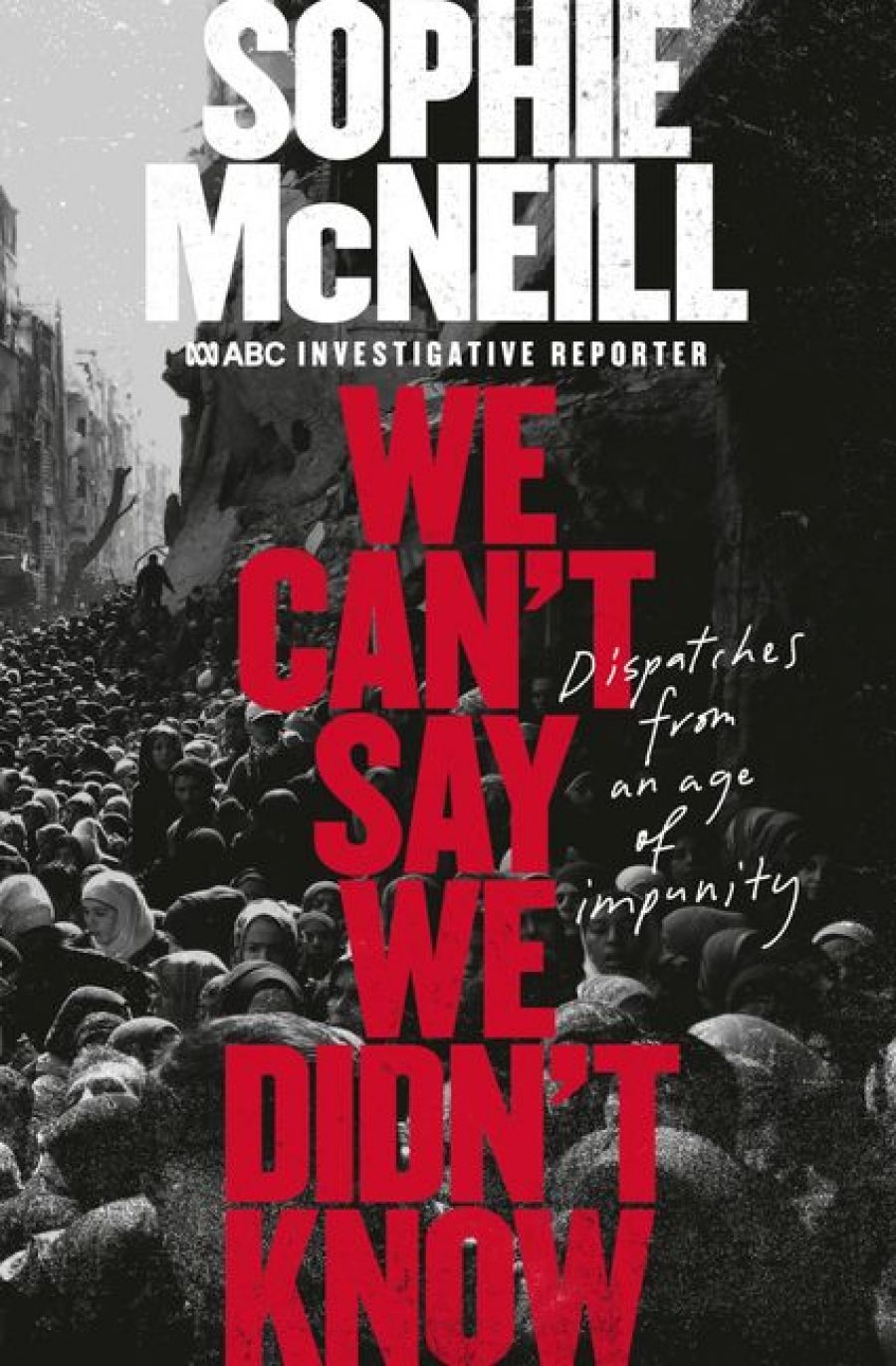
- Free Article: No
- Contents Category: International Studies
- Review Article: Yes
- Custom Highlight Text:
In 1991, French sociologist Jean Baudrillard provocatively claimed that ‘the Gulf War did not take place’. His argument was not a denial of the violence, suffering, and death experienced by civilians but rather that those very realities were absent in the mediatised consumption of the conflict. Dominant discourses reproduce the key events of the age, and the distant spectator can hardly escape the saturation of simulated symbols they entail. In Baudrillard’s words, ‘the warriors bury themselves in the desert leaving only hostages to occupy the stage, including all of us as information hostages on the world media stage’.
- Grid Image (300px * 250px):

- Book 1 Title: We Can’t Say We Didn’t Know
- Book 1 Subtitle: Dispatches from an age of impunity
- Book 1 Biblio: ABC Books, $34.99 pb, 416 pp
The violence that has engulfed Syria for almost a decade forms the backdrop of the first half of the book. Indeed, the title stems from McNeill’s original reporting on the evacuation of civilians from a besieged eastern Aleppo. With her accessible and captivating prose, McNeill narrates various aspects of Syria’s tragedy. She documents how hopes for peaceful change diminished as popular dissent in 2011 was met by a ruthless government crackdown and how it ultimately developed into civil war. The people she profiles testify to the withholding of food aid and the targeting of health-care facilities as callous strategies of war. Other narratives tell of civilians wounded by barrel bombs, family separation, displacement, and the impacts of social isolation for refugees in Europe. As one of her interviewees reports, ‘Syria can teach you that things can always get worse.’
 A hell cannon found after the battle of Aleppo in December 2016 (photograph via Wikimedia Commons/International Mine Action Center in Syria, Aleppo)
A hell cannon found after the battle of Aleppo in December 2016 (photograph via Wikimedia Commons/International Mine Action Center in Syria, Aleppo)
Rather than autobiographical memoirs of a journalist in the field, the book gives centre stage to the portraits of heroic characters whose individual fates represent the devastating contours of Syria’s conflict landscape. McNeill here goes far beyond the limited soundbites and feature stories of ‘people behind the headlines’ that might appear in daily news. Instead, her three-dimensional protagonists and their complex dilemmas develop across the chapters. Each story presents a compelling example of personal sacrifices made for loved ones, community, or ideals. The tragic denouement of the love story between young revolutionaries Noura and Bassel is followed by the desperations of ‘Doctor’ Khalid, a ward nurse stepping up to perform increasingly impossible life-saving surgery on civilians in his besieged area, as the United Nations failed to provide supplies and alleviate malnutrition.
While the position of the author is mostly unobtrusive, on occasion McNeill powerfully breaks the fourth wall of journalism and enters into the scene as an actor herself alongside her Middle Eastern subjects. This appears to be precisely what she is calling for her readers to do: to go beyond observing and take decisive action. For example, while reporting on the chaotic beach scenes on the refugee trail in Greece, an emotional encounter with ‘one old man standing alone by himself, leaning on a cane and quietly crying’ compels the author to step outside the journalistic brief. ‘None of us wanted to just carry on and pretend we had never met Nazieh and heard his desperate tale,’ she writes as her film crew embark on a quest to reunite him with his separated family members.
The remainder of the book expands the scope from Syria’s unspeakable horror and suffering to cover similar experiences from the wider Middle East (Yemen, Iraq, Palestine, and the Arabian Gulf). The regional scope, as well as her determination to capture the nuances in violations committed by all actors, is certainly a strength of McNeill’s work. While condemning the devastation caused by the Saudi-led bombardment in Yemen, she does not shy away from highlighting the recruitment of child soldiers by Houthi rebels on the other side. She shows how civilians in Iraq and Syria have been simultaneously victims of Islamic State terror and US-led international coalition airstrikes. Likewise, not only Israel but also the inter-Palestinian rivalry (between Hamas and the Palestinian Authority) have deprived Palestinian civilians of urgent medical care.
In presenting these nuances, McNeill also highlights Western double standards across the region: complicity in oppressive policies of wealthy Gulf states, while condemning the same practices elsewhere. Another recurring theme and frustration from reporting on the region is the arbitrary nature of why one story or image attracts global media interest, while others – equally deserving – fail. Why did the story of Rahaf Mohammed escaping from Saudi Arabia’s oppressive male guardianship laws become viral news, symbolising the national condition of women, while the similar situation of Dina Ali had not? Further, when does short-lived outrage have the power to bring about decisive change before tomorrow’s new headlines? How to maintain global interest and momentum when violations are repeating ad infinitum?
In contrast to previous atrocities (the Rwandan genocide, the Biafra crisis, the Srebrenica massacre, etc.), those of today can be live-tweeted blow by blow. The Syrian conflict is likely the most painstakingly well-documented in history, yet still the violations persist. While offering a bleak commentary on the limitations of modern journalism to prevent such transgressions, McNeill’s narrative approach also delivers a potential solace: that to engage with the experiences of individuals and capture their bravery might be a catalyst for necessary collective action.


Comments powered by CComment